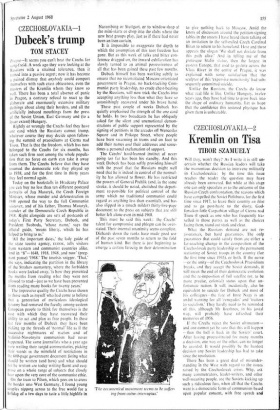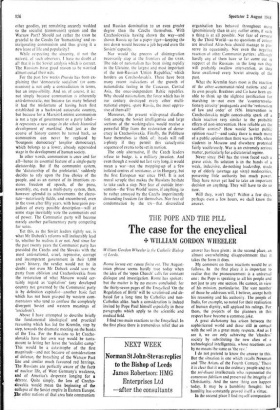Kremlin on Tisa
CZECHOSLOVAKIA-2 TIBOR SZAMUELY
Will they, won't they? As I write it is still un- certain whether the Russian leaders will take
the momentous decision to intervene militarily in Czechoslovakia : by the time this issue reaches the reader the question may have already been answered. But while at this stage
one can only speculate as to the outcome of the Russian-Czech confrontation, the reasons which have compelled the Soviet Politburo, for the first time since 1917, to leave their country en bloc and to go post-haste to the dusty, God- forsaken little Carpathian village of Cierna nad Tisou (1 speak as one who has frequently tra- velled in those parts). as well as the choices facing them, stand out stark and clear.
What the Russians demand are not re- assurances, but hard guarantees. The only guarantees that could satisfy them are either a far-reaching change in the composition of the Czechoslovak party leadership or the permanent stationing of Soviet troops in the country (for the first time since 1945), or both. If the nerve —or the unity—of the Czechoslovak Praesidium breaks, and they accept the Soviet demands, it will mean the end of their democratic evolution and the re-imposition of full satellite (or, to be more precise, colonial) status upon that un- fortunate nation. It will, incidentally, also be equivalent to suicide for Dubcck and most of his colleagues—the fate of Imre Nagy is an awful warning for all 'renegades' and 'traitors to socialism.' They hardly need to he reminded of this, although Mr Brezhnev, in his jovial way, will probably have refreshed their memories of 1956.
If the Czechs reject the Soviet ultimatum— and one cannot yet be sure that this will happen —then the ball is back in the Soviets' court. After having procrastinated for many months a decision, one way or the other, can no longer be avoided. It would possibly be the hardest decision any Soviet leadership has had to take since the revolution.
There has been a great deal of misunder- standing in the West with regard to the issues raised by the Czechoslovak crises. Why, ask many commentators, leader-writers, and other well-meaning people. are the Soviets kicking up such a ridiculous fuss, when all that the Czechs want is a democratic form of communism based upon popular consent, with free speech and other goodies, yet remaining securely wedded to the socialist (communist) system and the Warsaw Pact? Should not rather the USSR be grateful to the Czechs for 'humanising' and re- invigorating communism and thus giving it a new lease of life and popularity?
While respecting the sincerity, it not the naïveté, of such observers, I have no doubt at all that it is the Soviet analysis which is correct. The Russians have good reason to be worried almost out,of their wits.
For the past few weeks Pravda has been ex- plaining that 'democratic socialism' (or com- munism) is not only a contradiction in terms, but an impossibility. And so, of course, it is : not simply because communism is inherently anti-democratic, not because (as many believe) it had the misfortune of having been first established in a backward autocratic country, but because for a Marxist-Leninist communism is not a type of government or a party label— it represents a new stage in the whole historical development of mankind. And just as the course of history cannot be turned back, so communism can never be replaced by 'bourgeois democracy' (anglice democracy), which belongs to a lower, already superseded stage in the development of human society.
In other words, communism is once and for all—hence its essential feature of a single-party dictatorship. But if the communist system, the 'dictatorship of the proletariat,' suddenly decides to rely upon the free choice of the people, and as an earnest of its intentions re- stores freedom of speech, of the press, assembly, etc, even a multi-party system, then, however splendid its achievements, the electo- rate—notoriously fickle, and encumbered, even in the USSR after fifty years, with bourgeois pre- judices of every possible description—will at some stage inevitably vote the communists out of power. The Communist party will become merely another parliamentary party competing for votes.
Yet this, as the Soviet leaders rightly see, is what Mr Dubcek's reforms will ineluctably lead to, whether he realises it or not. And since for the past twenty years the Communist party has provided the Czechs and the Slovaks with the most anti-national, cruel, repressive, corrupt and incompetent government in their 1,000 years' history, the verdict would not be in doubt: not even Mr Dubcek could save the party from oblivion and Czechoslovakia from the restoration of what Moscow would cer- tainly regard as 'capitalism' (any developed country not governed by the Communist party is by definition capitalist—another basic fact which has not been grasped by western com- mentators who tend to confuse the completely divergent Soviet and western meanings of 'socialism).
Above I have attempted to describe briefly the fundamental ideological and practical reasoning which has led the Kremlin, step by step, towards the dramatic meeting on the banks of the Tisa. For the Russians to let Czecho- slovakia have her own way would be tanta- mount to letting her leave the 'socialist camp.' This would be a catastrophe of the first magnitude—and not because of considerations of defence, the breaching of the Warsaw Pact line and similar much favoured red herrings. The Russians are perfectly aware of the facts of nuclear life, of West Germany's weakness, and of America's desperate longing for a détente. Quite simply, the loss of Czecho- slovakia would mean the beginning of the collapse of the Soviet empire in Eastern Europe: be other nations of that area hate communism and Russian domination to an even greater degree than the Czechs themselves. With Czechoslovakia having shown the way—and shown Russia up for a paper tiger—keeping the rest down would become a job beyond even the Soviets' capacity.
Nor would the process of disintegration necessarily stop at the frontiers of the Lissa. The tide of nationalism has been rising rapidly in the Ukraine, the largest and most important of the non-Russian 'Union Republics,' which borders on Czechoslovakia. There have been many recent indications of the growth of nationalistic feeling in the Caucasus, Central Asia, the once-independent Baltic republics. Why should nationalism, the force which has in our century destroyed every other multi- national empire, spare Russia, the most oppres- sive of them all?
Moreover, the present widespread disaffec- tion among the Soviet intelligentsia and large sections of the working-class would receive a powerful fillip from the restoration of demo- cracy in Czechoslovakia. Finally, the Politburo have themselves to think of : heads will roll a-plenty if they permit this cataclysmic sequence of events to be set in motion.
The only alternative, if the Czech leaders refuse to budge, is a military .invasion. And even though it would not last very long, it would mean a war—not the mopping-up of a 'few isolated centres of resistance, as in Hungary, but the first European war since 1945. It is not moral scruple that makes the Russians hesitate to take such a step. Nor fear of outside inter- vention—the 'Free World' seems, if anything, to be rather annoyed by the Czechs impertinently demanding freedom for themselves. Nor fear of condemnation by the utsi—that discredited
organisation has behaved throughout more ignominiously than in any earlier crisis, if such a thing is at all possible. Nor fear of censure by the Third World—as no questions of colour are involved Afro-Asia should manage to pre- serve its equanimity. Nor even the negative reaction of other Communist parties: although hardly any of them have so far come out in support of the Russians. in the long run they will probably swallow intervention, as they have swallowed every Soviet atrocity of the past.
What the Kremlin fears most is the reaction of the other -communist-ruled nations and of its own people. Brezhnev and Co have been un- able to think up the slightest justification for marching in—not even the 'counterrevolu- tionary atrocity' propaganda and the 'restoration of law and order' of 1956. Intervention in Czechoslovakia might conceivably spark off a chain reaction very similar to the probable effects of non-intervention. How reliable are the satellite armies? How would Soviet public opinion react?—and today there is much more of a public opinion than there was in 1956, when students in Moscow and elsewhere protested fairly vociferously. War is an extremely serious matter, particularly for a dictatorial regime.
Never since 1941 has the USSR faced such a grave crisis. Its solution is in the hands of a weak, indecisive, do-nothing leadership, made up of elderly (average age sixty) mediocrities, possessing little authority but much power. They have never yet had to take an important decision on anything. They will have to do so now.
Will they, won't they? Within a few days, perhaps even a few hours, we shall know the answer.







































 Previous page
Previous page